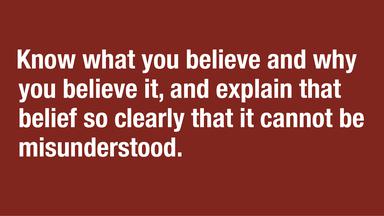In a January 13, 2016, segment of HuffPost Live, entertainer Lindsey Stirling describes her faith as a "staple of my life that's helped me maintain who I am as everything else changes." She then notes how fans react to learning she's a Latter-day Saint.

"Whenever I talk about it, it's interesting [to see] this influx of comments of either, 'You go girl,' 'the Lord is good!' to 'Oh, my gosh, I liked you until I heard you talk about that,'" Stirling says. "It's kind of sad how talking about faith brings up this huge divide."[1]
Though concerning, this divide is not as stark as it may seem; one can be turned off by forms of religious speech and not necessarily be secular. It’s true that the respected Pew Research Center tells us the "nones" (the religiously unaffiliated, which make up nearly a quarter of the U.S. population) are "becoming increasingly secular." And the younger they are, the gloomier those who belong to a church might perceive things to be. Only 38 percent of millennials born between 1990 and 1996 say religion is important in their lives. But notably, 61 percent of all nones believe in God.[2]
If, as Pew reports, only a quarter or less of millennials read scripture or participate in prayer at least once a week or rely on religious teachings for moral guidance, we can assume that much of what they perceive organized religion to be stems from a lack of familiarity with the religious experience. What they know of religion rarely goes deeper than the headlines.

Helping those who don’t belong to a church understand religion and its motives is more likely to come about (though it’s not guaranteed) if people of faith not only know what they believe and why they believe it but also explain that belief so clearly that their witness cannot be misunderstood. And this will hopefully lead to what one writer calls a “virtuous cycle of dialogue and the hard work of forging real understanding and enduring agreements.”[3] Yet truly understanding religion goes far beyond description of belief; it’s more about relationships, good works and the trust that comes from good conduct.
Role Reversal and Articulation of Belief
We often consider the unfamiliar to be strange and even scary, so it's no surprise that many of those without formal religious experiences would consider organized religion not only unimportant, but also the proclamation of faith as silly or threatening.
Perhaps misunderstandings could be minimized and respect increased if both sides more often engaged in role reversal — an act Rabbi Jonathan Sacks describes as "putting yourself in the place of those you despise, or pity, or simply do not understand."[4] What is it like to be the other? Why do they think what they think and do what they do? Without significant engagement with them, we can’t know their beliefs, their cultures or their experiences.
What Russell Moore, head of the Southern Baptist Convention’s Ethics and Religious Liberty Commission, says about those who disagree with Christians on family issues also applies to many of those who don’t understand a lived religious experience. “[They] aren't part of some conspiracy, as though they were cartoon super-villains plotting in a lair. They are, like all of us, seeking a way that seems right to them. We ought to love those who disagree with us, including those who see us as bigots. They are not our enemies."[5] And Daniel Mark of the U.S. Commission on International Religious Freedom adds, "There is much truth to the cliché that if only people got to know each other, they would respect each other much more."[6]
But establishing a détente between the faithful and secular of all varieties will take more than role reversal and seeing the human in the other. Articulating the what, why and how of belief and experience also plays a pivotal role.
All of us have ways of thinking, speaking and acting that are unique to us and embedded into the fabric of our everyday lives. These things are often so common and familiar to us that we think everyone understands our belief system, our vocabulary and the motivations underpinning our actions. But it may not be so simple. As any person of faith knows, the world’s religious traditions are vast and diverse and take a lifetime to fully comprehend — even for the devout.
President Dieter F. Uchtdorf of The Church of Jesus Christ of Latter-day Saints’ First Presidency teaches that those who "stop asking questions, stop thinking, stop pondering" can "thwart" guidance from heaven.[7] And so, in the case of people of faith, we must look upward and inward and ask ourselves whether we know enough about our beliefs and practices to clearly articulate them among strangers and fellow citizens. Are we capable, as the apostle Peter says, to “give an answer to every man that asketh [us] a reason of the hope that is in [us]”?[8]
We should communicate our beliefs and opinions with each other and the outside world, keeping in mind Moore’s words to "articulate things we once could assume."[9] For example, belief that marriage should be between man and woman is no longer self-evident for many.[10] Recognizing that not everyone thinks or believes as we do, Latter-day Saint leaders have provided resources explaining the divine institution of marriage (see, for example, here, here and here). The Church also engages in constructive dialogue with gay rights proponents — and in 2015 this led to landmark legislation in Utah that protects religious freedom and prevents discrimination in housing and employment (see transcript to press conference encouraging the legislation).
Above all, we should remember the wisdom of the New Testament apostle Paul, who counseled the early Saints to ensure their teachings were given out “with grace, seasoned with salt.”[11]
[1] “What Happened When This Famous Musician Opened Up About Her Mormon Faith,” Huffington Post, Jan. 13, 2016, http://www.huffingtonpost.com/entry/lindsey-stirling-mormon_56966e41e4b086bc1cd608c8?cps=gravity_2445_4863985842251298957&kvcommref=mostpopular.
[2] “U.S. Public Becoming Less Religious,” PewForum.com, Nov. 3, 2015, http://www.pewforum.org/2015/11/03/u-s-public-becoming-less-religious/.
[3] Thomas L. Friedman, “The Age of Protest,” nytimes.com, Jan. 13, 2016, http://mobile.nytimes.com/2016/01/13/opinion/the-age-of-protest.html?_r=0.
[4] Rabbi Jonathan Sacks, Not in God’s Name: Confronting Religious Violence, 183.
[5] Russell Moore, Onward: Engaging the Culture without Losing the Gospel, 182.
[6] “Religious Freedom Expert Praises Church’s Family Home Evening Program,” http://www.mormonnewsroom.org/article/religious-freedom-expert-church-family-home-evening-program.
[7] Dieter F. Uchtdorf, “Acting on the Truths of the Gospel of Jesus Christ,” Jan. 2012, https://www.lds.org/broadcasts/article/worldwide-leadership-training/2012/01/acting-on-the-truths-of-the-gospel-of-jesus-christ?lang=eng.
[8] 1 Peter 3:15.
[9] Russell Moore, Onward: Engaging the Culture without Losing the Gospel, 221.
[11] Colossians 4:6.